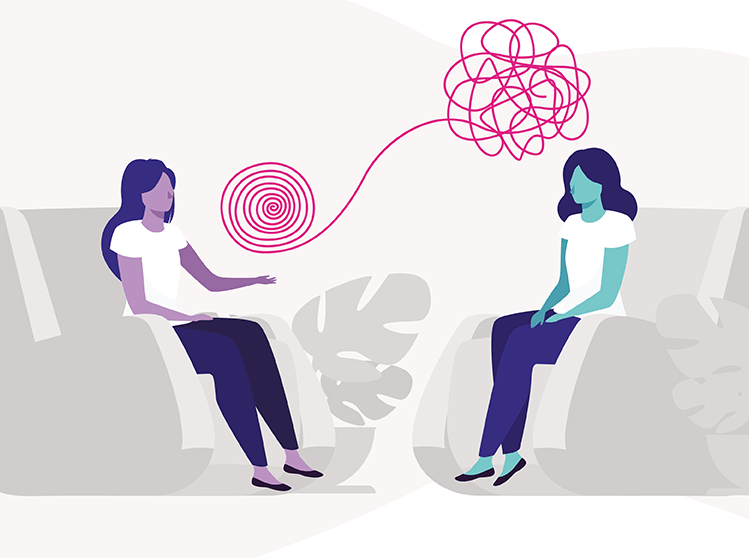Why Inpatient Mental Health Services Are Important for Healing
Why Inpatient Mental Health Services Are Important for Healing
Blog Article
Comprehensive Inpatient Mental Health And Wellness Services for Effective Treatment
Inpatient psychological health and wellness services represent an important element of the healthcare system, providing a structured and extensive environment for people experiencing extreme mental distress. Checking out the nuances of this continuum discloses substantial ramifications for both individual recuperation and more comprehensive psychological health outcomes.
Recognizing Inpatient Mental Health And Wellness Solutions
Inpatient mental wellness services provide essential assistance for individuals experiencing extreme mental distress that can not be managed properly in an outpatient setup. These services are designed to supply an intensive degree of care in a structured atmosphere, frequently within a medical facility or specialized center. Individuals admitted to inpatient programs commonly present acute symptoms, such as suicidal ideation, severe depression, or psychosis, requiring round-the-clock surveillance and intervention.
The admission procedure typically involves a thorough evaluation by psychological health professionals, who review the person's mindset, background, and immediate demands. Once admitted, people take part in a selection of therapeutic techniques customized to their specific demands, consisting of medication administration, specific therapy, and group sessions. This alternative strategy aims to support the person's problem, promote security, and foster coping abilities.
Inpatient psychological health services not only address immediate health and wellness worries yet also act as a bridge to continuous treatment. By giving a regulated environment, these services assist in the growth of therapy strategies that can be proceeded in outpatient settings, thus making sure a continuum of treatment and boosting lasting end results for people with complex mental health needs.
Secret Components of Effective Treatment
Effective treatment in inpatient mental health services makes up a number of essential elements that promote healing and stabilization. A detailed analysis is necessary to determine the individual's certain requirements and difficulties. This assessment informs the growth of a customized treatment plan, which offers as a roadmap for treatment.
One more vital element is the multidisciplinary team approach. Cooperation amongst psychoanalysts, psychologists, nurses, and social employees ensures that numerous point of views contribute to the patient's treatment, improving the effectiveness of therapy. Evidence-based restorative modalities, such as cognitive-behavioral treatment (CBT) and dialectical behavior modification (DBT), are additionally important, supplying organized methods that attend to maladaptive idea patterns and behavior concerns.

Lastly, a focus on aftercare preparation is important to ensure a smooth shift to outpatient services, lessening the risk of regression and promoting long-term health. These collective elements create a reliable treatment structure within inpatient mental wellness services.
Advantages of Comprehensive Care

Extensive treatment in inpatient psychological health services uses countless benefits that substantially enhance client results. Among the key advantages is the holistic method to treatment, addressing not only the mental signs yet additionally the physical, social, and psychological needs of patients. This extensive analysis permits for customized treatments that advertise total health.
An additional advantage is the integration of multidisciplinary groups, which our website fosters collaboration among Clicking Here healthcare professionals. This collaborative environment ensures that clients receive coordinated care, reducing the threat of fragmented therapy and boosting interaction amongst caretakers. Moreover, detailed treatment helps with continuity of services, allowing for smooth changes from inpatient to outpatient setups, which is vital for long-lasting healing.

Last but not least, the organized setting of detailed inpatient treatment offers a safe space for patients to participate in healing tasks, assisting them establish coping strategies and strength. Jointly, these benefits contribute to more reliable therapy and enhanced lifestyle for people experiencing psychological health and wellness crises.
Evidence-Based Healing Techniques
In the realm of mental wellness treatment, evidence-based therapeutic strategies play a critical function in guaranteeing that clients receive reliable and clinically sustained treatments. These methods incorporate the very best available study with medical knowledge and patient worths, fostering a customized treatment experience that resolves individual demands.
Cognitive Behavior Therapy (CBT) is among one of the most widely acknowledged evidence-based approaches, concentrating on determining and altering adverse thought patterns and habits. This organized strategy has demonstrated effectiveness in dealing with problems such as ptsd, anxiousness, and clinical depression. Dialectical Actions Treatment (DBT) is specifically reliable for people with borderline Going Here individuality problem, stressing the growth of psychological guideline and social efficiency abilities.
Furthermore, medicine administration is commonly an indispensable part of evidence-based therapy, as psychotropic medicines can minimize signs and enhance overall functioning. Joint treatment designs, which involve multidisciplinary teams, further boost the efficiency of inpatient solutions by making sure detailed assessments and continuous monitoring.
Inevitably, the combination of evidence-based restorative approaches not only advertises positive clinical end results yet additionally equips patients, fostering a feeling of agency and resilience in their psychological health and wellness journeys.
Transitioning to Outpatient Assistance
The shift from inpatient mental wellness services to outpatient support marks an essential stage in a patient's recuperation journey. This duration needs mindful preparation and coordination to ensure continuity of care and to minimize the dangers of regression or situation. Efficient discharge planning must commence early in the inpatient remain, involving a multidisciplinary group that consists of psychiatrists, psycho therapists, nurses, and social employees.
Key aspects of an effective transition consist of the development of a detailed aftercare strategy tailored to the individual's details needs. This strategy needs to describe follow-up consultations, medication administration, and healing treatments, as well as determine area resources and support system that can promote ongoing healing.
Moreover, client and household education and learning is vital during this phase. Comprehending the indicators of possible setbacks and the significance of sticking to therapy can encourage patients and their support group.
Regular follow-up and reassessment of the outpatient plan are necessary to resolve evolving challenges. By promoting a collective connection between outpatient and inpatient providers, the likelihood of sustained recovery increases, ultimately enhancing the patient's lifestyle and decreasing the risk of readmission.

Final Thought
In summary, extensive inpatient mental health services offer an important framework for dealing with severe psychological distress through a multidisciplinary approach. Eventually, such detailed care is important for long-term mental wellness and health.
The admission procedure normally includes an extensive assessment by psychological wellness experts, who assess the individual's psychological state, history, and immediate needs.Reliable therapy in inpatient mental health solutions makes up several vital parts that promote recovery and stablizing.Detailed care in inpatient psychological health and wellness services supplies many benefits that significantly boost client outcomes.The shift from inpatient mental wellness services to outpatient assistance marks a crucial stage in a client's recovery trip.In summary, detailed inpatient mental wellness services supply a vital structure for attending to severe mental distress through a multidisciplinary technique.
Report this page